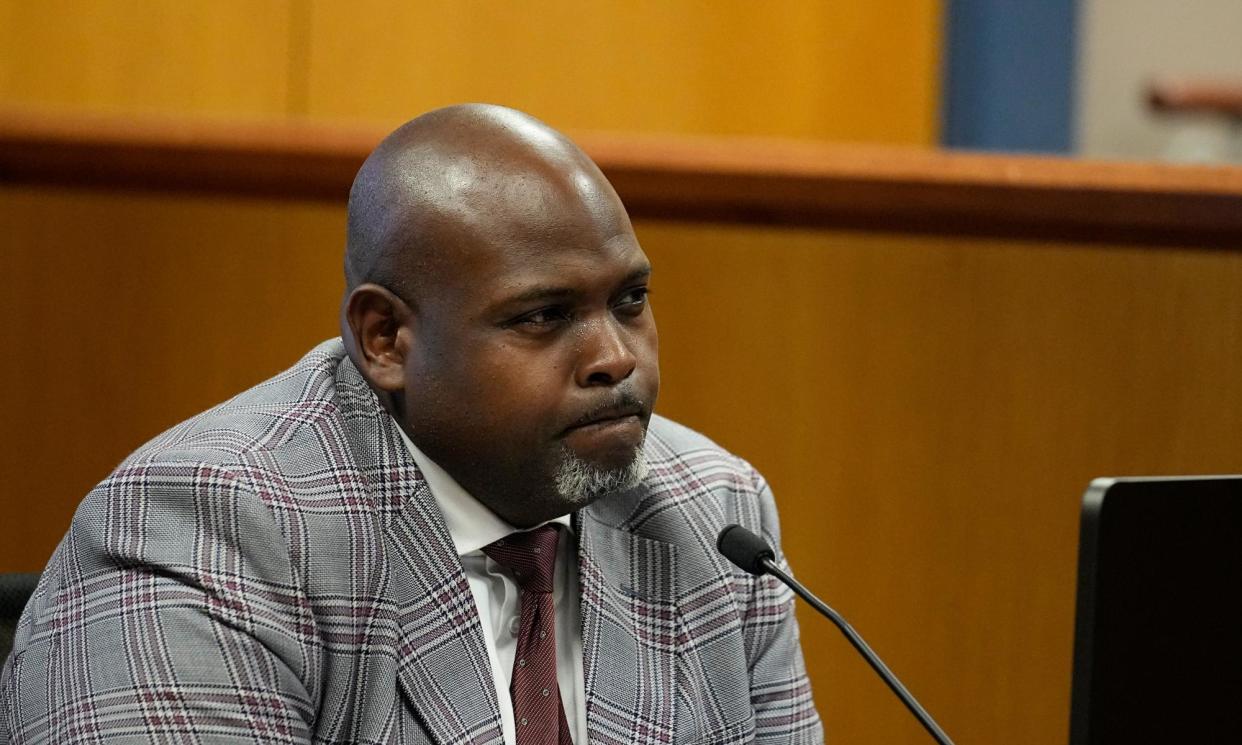Star witness for Trump defendants in Georgia fails to give damning testimony

- Oops!Something went wrong.Please try again later.
- Oops!Something went wrong.Please try again later.
Lawyers for Donald Trump’s co-defendants charged in Georgia over efforts to overturn the 2020 election were unable on Tuesday to get their star witness to repeat in court what he had previously alleged about the Fulton county district attorney’s affair, as they seek to have her thrown off the case.
Related: Pretty, pretty bad: Curb Your Enthusiasm takes on voter suppression
“I was speculating and I never witnessed anything. It was speculation,” Terrence Bradley said about text messages he sent to one of the defense lawyers in January that alleged the district attorney Fani Willis and her deputy Nathan Wade were romantically involved earlier than they had claimed.
Bradley’s inability to confirm anything about the affair meant there was no new evidence introduced at the hearing in Fulton county superior court as the presiding judge, Scott McAfee, weighs whether there was a conflict of interest requiring Willis’s disqualification.
Trump and more than a dozen allies were charged last year with violating the Georgia state racketeering statute when they took steps to overturn the 2020 election results in Georgia, including by advancing fake slates of electors and pressuring state officials to reverse Trump’s defeat.
The case took a twist in January when Ashleigh Merchant, the lawyer for Trump’s co-defendant Mike Roman, filed a motion to disqualify Willis from the case, complaining that Willis benefited financially from hiring Wade to work on the Trump case in 2021 because he paid for them to go on vacation.
The disqualification motion has been closely watched because if the judge relieves Willis from bringing the case, it could result in the entire district attorney’s office from also being thrown off, upending what remains one of the most legally perilous cases against Trump.
But after more than two hours of testimony from Bradley, the defense lawyers appeared no closer to meeting the high burden to force disqualification than when Bradley initially took the stand last week.
The defense lawyers had been hoping for weeks that Bradley would contradict the testimony from Willis and Wade, who claimed it started months after Wade had been hired to work on the Trump case in November 2021, since that could undercut their credibility in the eyes of the judge.
Bradley’s initial appearance yielded little new information after he repeatedly invoked attorney-client privilege – Bradley was Wade’s lawyer in the divorce proceedings undergirding the affair allegations – to avoid having to answer questions from the defense lawyers.
The judge later determined at a hearing, behind closed doors, that Bradley was using the attorney-client privilege inappropriately when it came to communications Wade had made to him about the affair and had to answer questions on that matter.
On Tuesday, Bradley returned to court but testified he had no personal knowledge about the affair and that he had been purely speculating when he texted Roman’s lawyer that Willis and Wade’s affair had started after they met at a municipal judges’ conference in 2019.
Bradley suggested the fact that he corrected only one part of the draft disqualification motion sent to him by Roman’s lawyer – he clarified his own contract with the district attorney’s office for unrelated work was for $74,000 – did not mean he was assenting to the rest of the document being accurate.
The Trump defense lawyer, Steve Sadow, at one point asked, incredulously, why he had speculated when he knew Roman’s lawyer had been asking him about the affair in order to finalise her motion to disqualify. “I don’t recall,” Bradley replied in a muted tone.
Bradley also testified he could not recall whether Wade had recounted having sex with Willis in her office before she became the district attorney, and that he had never seen or had personal knowledge if Wade had a key to Willis’s garage door around the same time.
To date, there has been no evidence proving Willis hired Wade and renewed his contract specifically to gain a financial benefit through any sort of kickback scheme. And Willis and Wade have both previously testified any expenses were shared equally or reimbursed with cash.
The judge now faces the issue of how much weight to attach to Bradley’s testimony. On the one hand, he could believe that Bradley is now telling the truth having previously lied, or he could believe Bradley was telling the truth when he texted Roman’s lawyer and lied on the stand.
The district attorney’s office has separately tried to impeach Bradley’s credibility by having him acknowledge he was essentially ousted from his previous law practice he shared with Wade over a sexual harassment claim; the suggestion has been that Bradley wanted to damage Wade.

